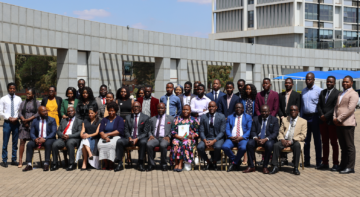Blogs

For at least two decades, the gap between policy and research has been increasingly highlighted within both policy and academic circles. We acknowledge that evidence generated from research is vital to the formulation of both national and international policy, and as such needs to reach policymakers in a format they understand. That being said, the disparity between research and practice is still evident. Researchers often produce study findings that policymakers need, but rarely package them in a manner that makes them usable by policymakers.
In an effort to lessen the research-to-policy gap, the Population Reference Bureau (PRB) and the African Institute for Development Policy (AFIDEP), have since 2018 collaborated in hosting an annual Policy Communication Fellows Programme. The programme seeks to bridge the gap that often exists between research and policy through an intensive workshop tackling communication in the policy sphere. Fellows undergo modules highlighting the policy process, strategic communications, policy presentations, data visualisation, and other effective policy communication skills. The fellowship takes a hands-on approach, with fellows developing policy pitches, policy briefs, blogs, and presentations along the way.
This year’s fellowship, which commenced in February, comprised 8 early-career researchers from Nigeria, Kenya, Ghana, Ethiopia and Tanzania. Each of the fellows is currently pursuing a PhD related to population and sexual and reproductive health rights. To ensure the fellowship is practical, fellows are encouraged to use their current research topics for all module exercises; one of which is how to present research findings to policymakers. The initial presentations made by the fellows were data-heavy and focused little on making Specific, Measurable, Achievable, Relevant, and Time-Bound (SMART) recommendations. However, as fellows were continuously directed by the programme facilitators, the presentations became less academic and easier to understand by those that are not subject-matter experts.
The fellowship placed much emphasis on a conversational approach to communicating research—with the guiding question being, ‘would my grandmother understand this?’ This was to encourage the participants to remember that research ought to be communicated assuming that no one else is a scientist, while not taking away from the science itself.
The fellowship is best described as a ‘learning while unlearning’ process. Commenting on the fellowship, one of the fellows stated, “I applied [for the fellowship] because I thought I was going to get a grant…but what I have found out is that I was looking for a fish, but they actually gave me the techniques for fishing itself. I’ve been able to communicate with stakeholders in family planning, being able to get their views. I have been able to personalise what I received from this fellowship. I’ve been able to get across to NGOs [involved in family planning], I’m getting connected to policymakers—and it’s bringing me much joy. I have been able to develop my thoughts in a way that is communicable to policymakers. All this I never received in medical school, but I have received in this fellowship.”
As the need for evidence in policymaking becomes more and more recognisable, we believe that capacity building workshops that focus on policy communication for researchers are vital. While easy to overlook, it should be noted that policy communication is often not taught at the PhD level, leaving early-career researchers with vast knowledge but no tools to use it to make an impact. If policy is to truly be evidence-based for the good of a nation’s citizenry, there is a need for institutions to invest in training those that generate the science to communicate it.
Fellows’ Testimonials
Related Posts





